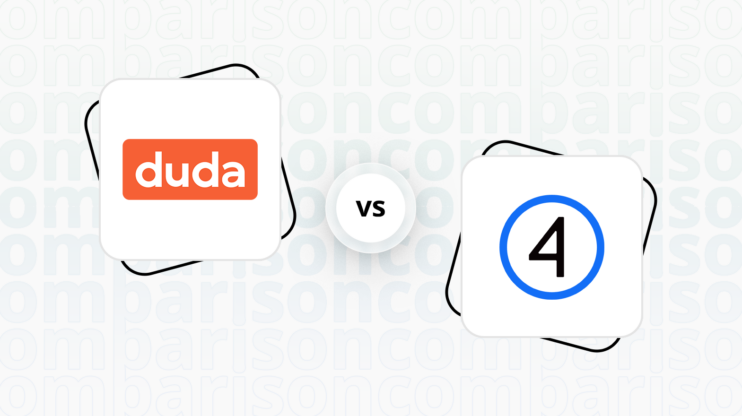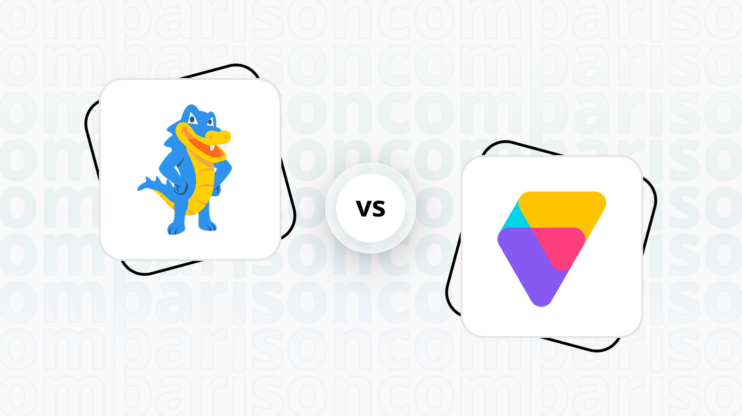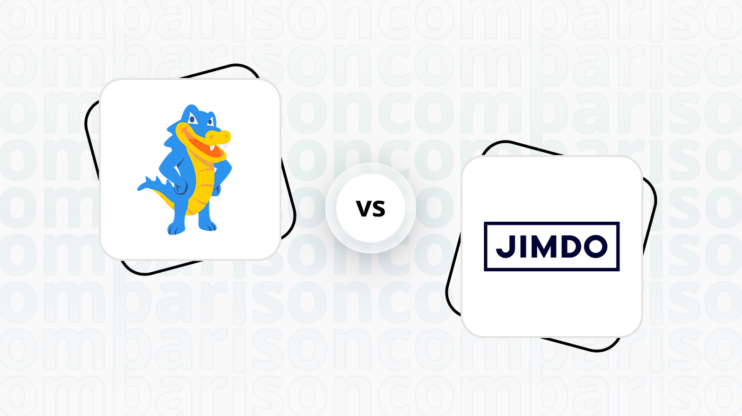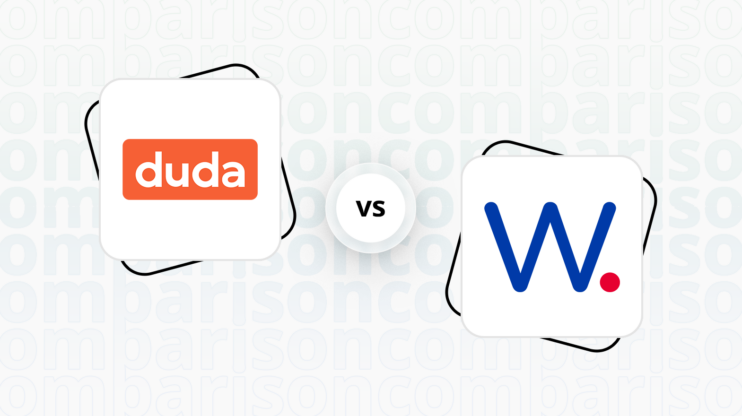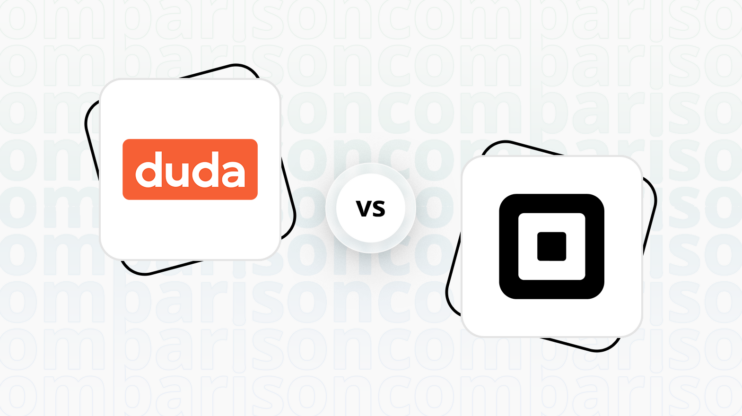Final verdict
Tilda and Adobe Commerce(ex Magento) both offer unique strengths, catering to different user needs and business scales.
-
Tilda (Overall Grade: 6.7/10)
is ideal for users seeking an intuitive, no-code website builder with a focus on design and visual content. It offers a range of pre-designed blocks and templates, making it suitable for bloggers, small businesses, and digital marketers. Tilda excels in ease of use and design functionalities, providing a user-friendly interface and modern, responsive templates. However, it falls short in advanced ecommerce features and scalability compared to Adobe Commerce(ex Magento). -
Adobe Commerce(ex Magento) (Overall Grade: 6.9/10)
is a robust, enterprise-level ecommerce platform designed for both B2B and B2C businesses. It offers extensive customization, scalability, and a wide range of ecommerce features, making it suitable for larger businesses with complex needs. Adobe Commerce(ex Magento) excels in ecommerce capabilities, security, and marketing features, but its complexity and higher cost may pose challenges for beginners or smaller businesses.

|

|
|
|---|---|---|
|
Design functionalities & templates |
8.6 |
6.7 |
|
Ease of use |
8.0 |
5.4 |
|
Ecommerce |
7.2 |
9.4 |
|
Website Editors |
8.0 |
7.8 |
|
Product testing options |
5.9 |
3.9 |
|
Price |
8.0 |
5.8 |
|
Hosting quality |
6.2 |
8.1 |
|
Website speed optimization |
4.9 |
6.6 |
|
Plugins and integrations |
7.6 |
9.1 |
|
Marketing features |
6.9 |
8.1 |
|
Customer support |
5.5 |
8.3 |
|
Security |
7.6 |
8.4 |
|
AI capabilities |
2.1 |
7.7 |
|
User Management |
7.3 |
8.0 |
Best for ecommerce
 7.2
7.2
 9.4
9.4
Verdict
: Adobe Commerce(ex Magento) is the superior choice for comprehensive and scalable ecommerce solutions, while Tilda is more suited for smaller, visually-focused online stores.
-
Tilda
: Tilda is a user-friendly platform ideal for small businesses and individuals looking to create visually appealing online stores without coding. It offers essential ecommerce features like product catalogs, payment gateways, and built-in CRM tools. However, in the Tilda vs Adobe Commerce(ex Magento) comparison, Tilda falls short in terms of scalability and advanced ecommerce functionalities. -
Adobe Commerce(ex Magento)
: Adobe Commerce(ex Magento) excels with its enterprise-level ecommerce capabilities, including advanced product and inventory management, multi-channel commerce, and robust security measures. It is designed for businesses that require extensive customization and scalability. In the Tilda vs Adobe Commerce(ex Magento) comparison, Adobe Commerce(ex Magento) stands out for its comprehensive features and ability to support large-scale operations.
Best for informational & business websites
 8.4
8.4
 7.4
7.4
Verdict
: Tilda is the superior choice for creating informational and business websites, thanks to its user-friendly interface and visually appealing design options. Adobe Commerce(ex Magento), while powerful, is more suited for complex ecommerce needs.
-
Tilda
: Tilda excels in creating visually stunning informational websites with its intuitive drag-and-drop interface and a wide range of pre-designed blocks and templates. It is particularly suitable for bloggers, small businesses, and digital marketers who prioritize design and ease of use. Tilda’s focus on typography and visual content makes it an excellent choice for those looking to create professional-looking websites without coding skills. With a score of 8.4, Tilda stands out for its simplicity and design flexibility. -
Adobe Commerce(ex Magento)
: Adobe Commerce(ex Magento) is a robust platform designed for scalability and customization, making it ideal for businesses with complex needs. However, its strength lies in ecommerce, and it may be overkill for simple informational websites. With a score of 7.4, Adobe Commerce offers extensive features and integrations, but its complexity can be a barrier for beginners. It is best suited for businesses that require advanced functionalities and are willing to invest in development resources.
Detailed comparison
Design functionalities & templates
Design FunctionalitiesRepresents how well each platform allows for creative design and customization of websites.Score Components:
- Template Variety (30%): Range and quality of design templates.
- Customization (30%): Flexibility and options for design alterations.
- User Interface (20%): Ease and intuitiveness of the design process.
- Responsiveness (10%): Adaptability to different devices and screen sizes.
- Innovation (10%): Unique design features and tools.
 8.6
8.6
 6.7
6.7
🏆
Winner: Tilda.
Tilda offers a diverse selection of design templates suitable for various types of content, all crafted by professional designers. These templates emphasize gorgeous typography, minimalist blocks, and striking images. Users have the flexibility to modify any template significantly or even start from scratch, ensuring the final website can meet a wide range of design preferences and requirements.
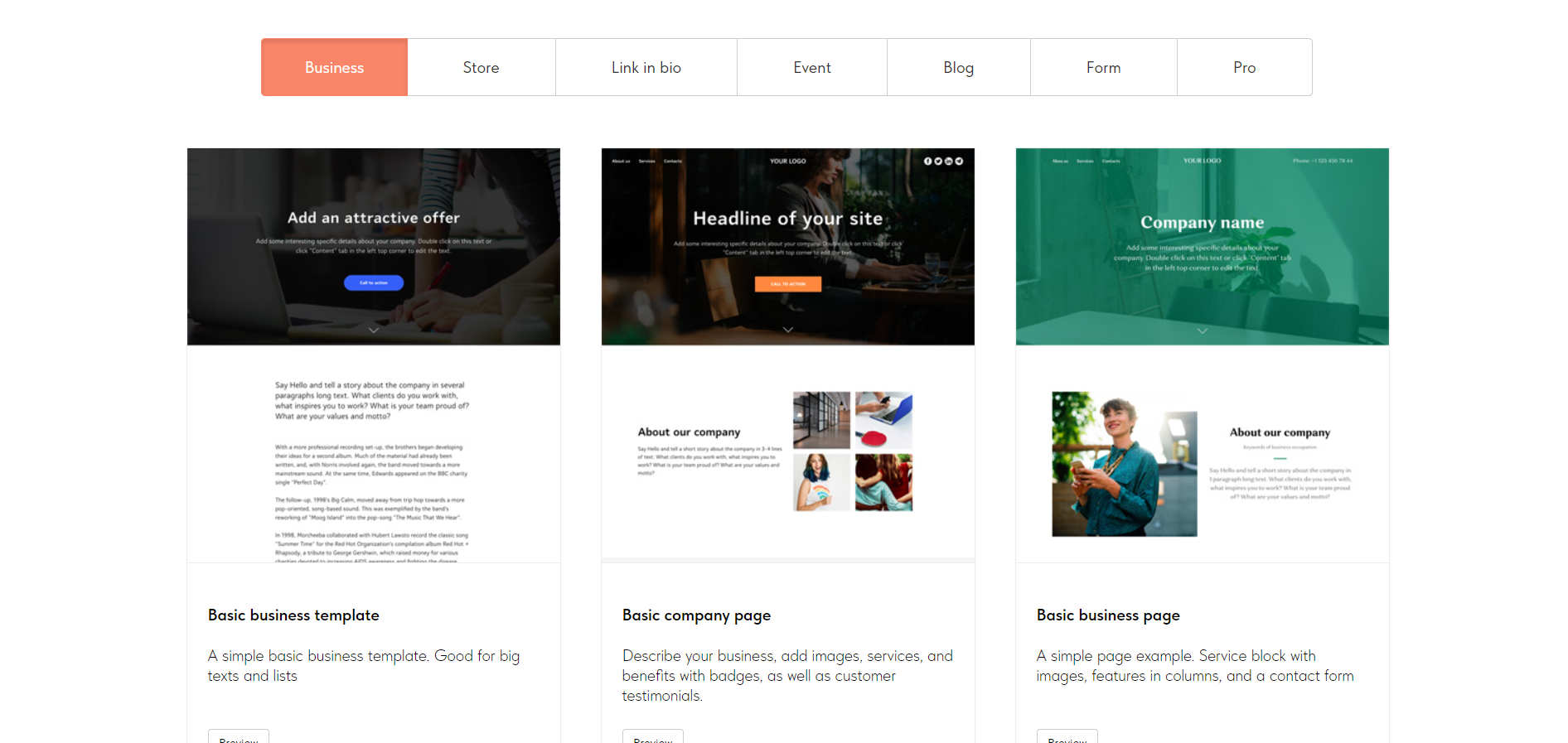

On the other hand, Adobe Commerce, formerly Magento, prioritizes flexibility over pre-built templates. While it offers a limited selection of base themes, users can access third-party themes for customization. Theme options are highly adaptable, allowing changes to layouts, colors, fonts, and the creation of custom page layouts. The platform provides a powerful theme framework for comprehensive control, including frontend editing for basic adjustments. Experienced developers can employ custom code (HTML, CSS, Javascript) for unique designs and advanced functionalities.
Adobe Commerce(ex Magento) Themes
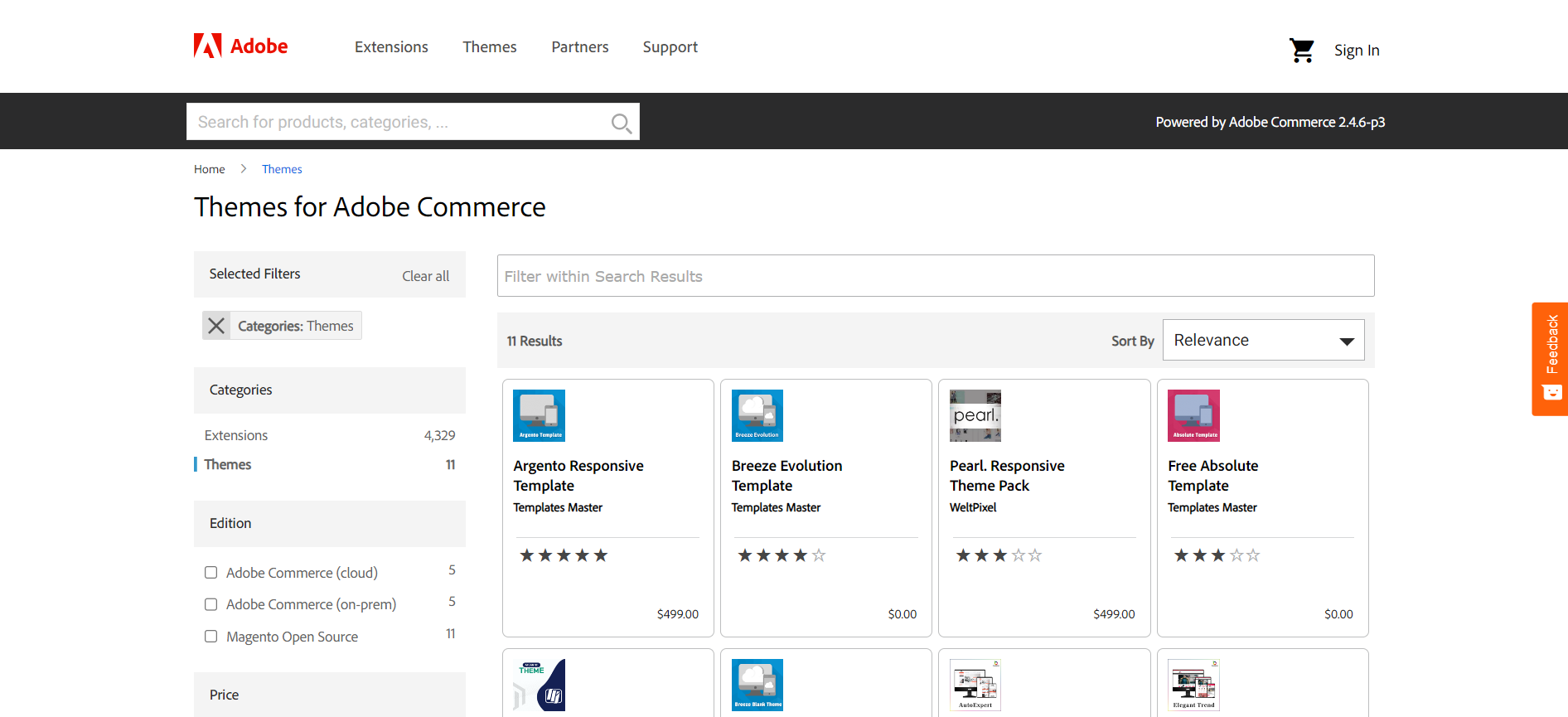
Get a head start on website creation with AI
Create a custom website tailored to your business needs 10X faster with 10Web AI Website Builder!
Ease of use
Ease of useReflects the platform’s overall user-friendliness.Score
Components:
- Learning curve (40%): Quickness and ease of getting started.
- Interface design (30%): Simplicity and intuitiveness of layout.
- User guidance (20%): Quality of tutorials and support.
- Flexibility (10%): Adaptability to various user skills.
 8.0
8.0
 5.4
5.4
🏆 Winner: Tilda
. Scoring 8.0, Tilda is known for its intuitive drag-and-drop interface and a wide range of modern, responsive templates suitable for various industries. Adobe Commerce(ex Magento), with a score of 5.4, offers high customization capabilities and scalability but can pose challenges for beginners due to its complexity.
Learning Resources
🏆 Winner: Adobe Commerce(ex Magento)
. Both platforms offer comprehensive learning resources, but Adobe Commerce(ex Magento) provides a more extensive array of learning resources, including videos, tutorials, and instructor-led courses through Adobe Digital Learning Services.
For ecommerce
EcommerceMeasures the platform’s effectiveness in supporting online business activities.Score Components:
- Ecommerce themes and templates (20%): Variety and design of templates.
- Product management (25%): Ease of managing and organizing products.
- Payment options (25%): Variety and convenience of payment methods.
- Ecommerce features (20%): Features for managing an ecommerce store.
- Integration (10%): Compatibility with external e-commerce tools and services.
 7.2
7.2
 9.4
9.4
When it comes to ecommerce, Adobe Commerce(ex Magento) outperforms Tilda with a score of 9.4 against 7.2. Adobe Commerce(ex Magento) is an enterprise-level ecommerce platform offering features such as product and inventory management, efficient order processing, customer account management, targeted marketing capabilities, diverse payment processing options, robust security measures, and scalability to accommodate business growth. On the other hand, Tilda offers a user-friendly platform for creating eCommerce websites with features like ready-made templates, various payment system integrations, and SEO optimization. It supports inventory management, CRM for order tracking, and tools for email marketing and membership areas.

|

|
|
|---|---|---|
|
Ecommerce themes and templates |
6.5 |
7.5 |
|
Product page customization |
7.0 |
9.0 |
|
Payment processing and commissions |
7.5 |
7.8 |
|
POS capabilities |
0.0 |
7.0 |
|
Payment gateways |
7.8 |
8.5 |
|
Product numbers |
6.0 |
7.5 |
|
Additional ecommerce features |
6.5 |
8.0 |
Tilda ecommerce features:
- Product Catalogs and Inventory management
- Payment Gateways integration
- Shipping options
- Order management
- Built-in CRM and marketing tools
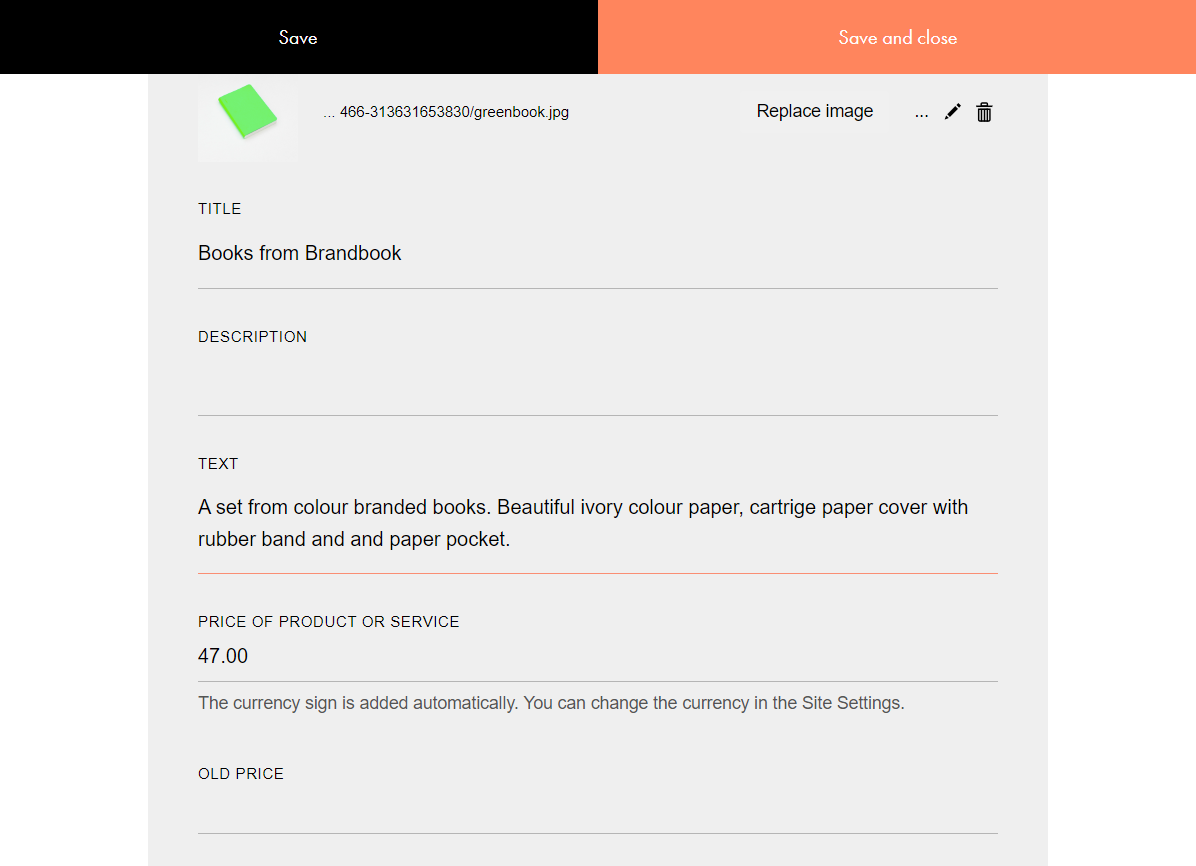
Adobe Commerce(ex Magento) ecommerce features:
- Product and Inventory Management
- Order Management
- Customer Management
- Marketing and Promotions
- Payment Processing
- Multi-Channel Commerce
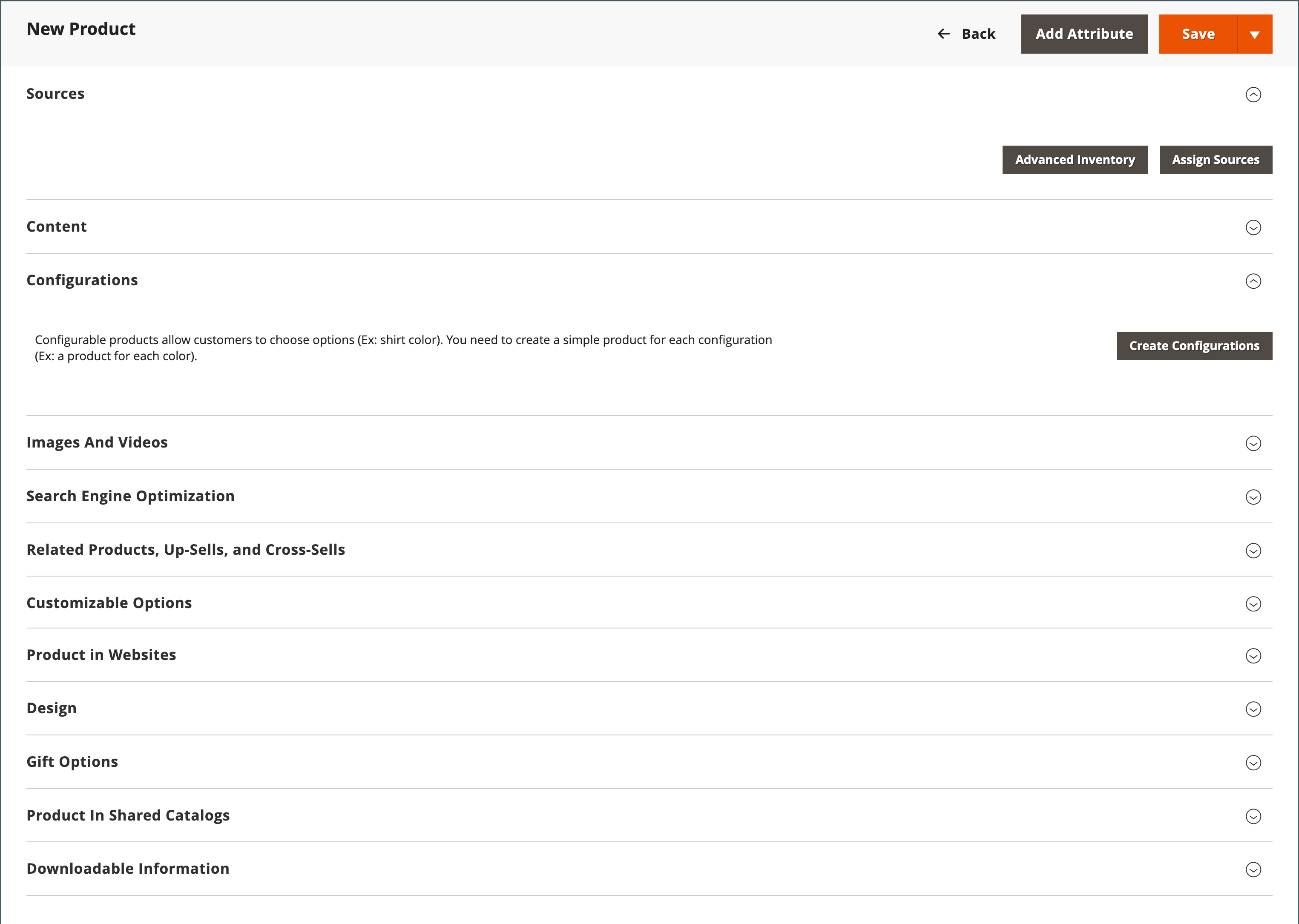
Ecommerce themes & templates
Tilda allows users to build their eCommerce sites using around 20 ready-made online store templates, emphasizing ease of use and the ability to create a store without needing coding or web design skills. Adobe Commerce, powered by Magento, offers a comprehensive ecosystem for ecommerce themes and templates, enabling businesses to customize their online stores to meet specific branding and functionality requirements.
Product page customization
Tilda enables a wide range of customizations for product pages in online stores, including the design, e-commerce functionalities, and integration with external services. Adobe Commerce, formerly known as Magento, offers extensive customization options for product pages, enabling businesses to enhance the user experience and tailor product displays to their specific needs.
Payment processing
The Tilda website builder supports a variety of popular payment systems such as Stripe, PayPal, and 2Checkout, allowing for easy integration to accept online payments. Adobe Commerce offers integrated payment solutions and commission management for seamless online transactions, alongside POS integration for omnichannel retail experiences. It supports a wide array of payment gateways, ensuring flexible and secure payment options for customers. These features make Adobe Commerce a versatile platform for businesses aiming to provide a comprehensive and secure shopping experience both online and in physical stores.
Website Editors
Website EditorsEvaluates the platforms’ website building and editing capabilities.Score Components:
- Customization tools (40%): Range and power of editing features.
- Editor usability (30%): User experience within the editor.
- Design flexibility (20%): Freedom in layout and design changes.
- Update and maintenance ease (10%): Simplicity of updating and maintaining the site.
 8.0
8.0
 7.8
7.8
🏆
Winner: Tilda
. Tilda, with a score of 8.0, offers a user-friendly, block-based design approach that simplifies the process of creating websites without requiring in-depth coding knowledge. It features advanced customization options through its Zero Block feature, allowing for detailed control over design elements for those needing more specific layouts. The platform supports responsive design, ensuring websites are optimized for all devices, and includes built-in SEO tools, analytics, and a range of integrations with third-party services for extended functionality.

Adobe Commerce(ex Magento), scoring 7.8, is a robust ecommerce platform designed for flexibility and scalability, enabling businesses to create customized online stores with extensive features for product management, customer engagement, and analytics. It supports both B2B and B2C models and offers a range of tools for marketing, SEO, and inventory management, along with a vast ecosystem of extensions. Suitable for businesses of all sizes, Adobe Commerce provides options for cloud-hosting or self-hosting, catering to a wide array of ecommerce needs.
Mobile editor/app
 5.5
5.5
 0
0
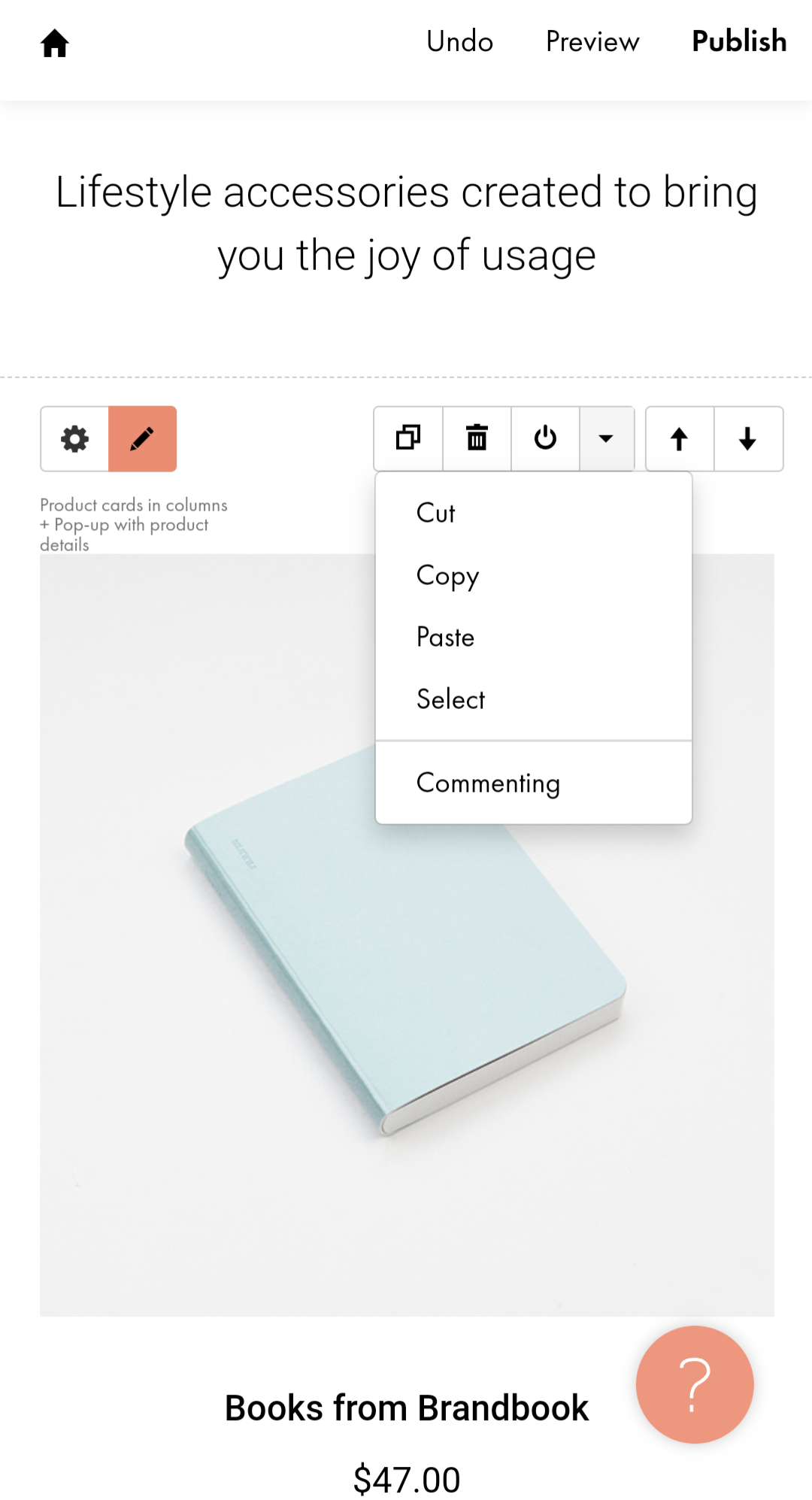
🏆
Winner: Tilda
. Neither Tilda nor Adobe Commerce (ex Magento) offer a dedicated mobile app for website editing. However, Tilda allows users to manage and edit their websites using the mobile browser version of the editor, providing some level of convenience for users who need to make changes on the go. On the other hand, Adobe Commerce does not offer any mobile editing capabilities at this time, which can be a limitation for users who prefer to manage their websites from a mobile device.
Product testing options
Product Testing OptionsAssesses the options for trying out platform features before commitment.Score Components:
- Trial quality (40%): Extent and usefulness of the trial or free version.
- Feature accessibility (30%): How many features are available to test.
- Trial duration (20%): Length of the trial period.
- Ease of transition (10%): Smoothness of moving from trial to paid plans.
 5.9
5.9
 3.9
3.9
Overall Result
:
Tilda Wins
. Tilda scores 5.9, while Adobe Commerce(ex Magento) scores 3.9 in product testing options. Tilda offers a free version where some premium features can be tested, while Adobe Commerce(ex Magento) does not have a free version but allows testing of premium features by requesting a demo version. Neither of the platforms offers a trial version or a money-back guarantee.

|

|
|
|---|---|---|
|
Free Plan |
Yes |
No |
|
Trial Duration |
No | No |
|
Testing Premium Features |
Some features with free plan |
By requesting a demo version |
|
Money Back Guarantee |
No | No |
Price
PriceLooks at the cost-effectiveness and value for money of each platform.Score Components:
- Plan value (40%): What each pricing tier offers.
- Transparency and clarity (30%): Clearness of pricing structures.
- Flexibility of plans (20%): Range of options to suit different budgets.
- Hidden costs (10%): Additional expenses not included in the plan.
 8.0
8.0
 5.8
5.8
Tilda offers more affordable and transparent pricing options, while Adobe Commerce(ex Magento) caters to larger businesses with its premium pricing strategy.

|

|
|
|---|---|---|
|
Free |
Free ($0/month): Tilda’s Free plan allows for 1 website with up to 50 pages per website and 50 MB of space per project. It includes a free subdomain on tilda.ws, responsive design on all devices, basic animations, a built-in image and icon library, and Tilda CRM. |
No offering at this amount. |
|
$10-$20 |
Personal ($15/month): The Personal plan offers 1 website with up to 500 pages and 1 GB of space. It includes all features of the Free plan plus the ability to connect a custom domain, advanced animations, full access to the Block Library, analytics, SEO tools, and online store capabilities. Value for price: 7.5 |
No offering at this amount. |
|
$20-$30 |
Business ($25/month): The Business plan expands capabilities to 5 websites per account, each with up to 500 pages and 1 GB of space, including source code export and API access. It builds upon the Personal plan features with additions suitable for more extensive business needs. Value for price: 9.0 |
No offering at this amount. |
|
$2000+ |
No offering at this amount. |
Adobe Commerce Pro and Managed Services ($2000/month): Adobe Commerce Pro and Managed Services are designed to deliver scalable, secure, and extensive eCommerce solutions tailored to a wide range of business demands. It offers a comprehensive set of ecommerce tools, including product and inventory management, efficient order processing, customer account management, targeted marketing capabilities, diverse payment processing options, robust security measures, and scalability to accommodate business growth. It also offers both self-hosted and cloud-hosted options, providing flexibility and optimized performance. While it does not have an AI website builder, it offers a powerful theme framework for comprehensive control, including frontend editing for basic adjustments. Experienced developers can employ custom code for unique designs and advanced functionalities. |
location. As a result in rare cases the prices displayed here can differ from the ones you see on their
websites.
Hosting quality
Hosting
qualityExamines the reliability and performance of the hosting solutions.Score Components:
- Uptime (40%): Consistency and reliability of website availability.
- Speed (30%): Loading times and performance.
- Bandwidth and storage (20%): Sufficiency of resources provided.
- Data centers (10%): Quality and distribution of hosting infrastructure.
 6.2
6.2
 8.1
8.1
Winner: Adobe Commerce(ex Magento)
Adobe Commerce (ex Magento) offers robust and scalable eCommerce solutions with both self-hosted and cloud-hosted options, providing flexibility and optimized performance. Tilda, on the other hand, offers cloud hosting with up to 1GB storage capacity but does not disclose the locations of its data centers. Adobe Commerce’s hosting quality is rated higher than Tilda’s.

|

|
|
|---|---|---|
|
Do they offer hosting? |
Yes, cloud hosting |
Yes, self-hosted and cloud-hosted options |
|
Data Centers: |
Not disclosed |
Leverages Amazon Web Services (AWS), specific details not publicly available |
|
Type of hosting: |
Cloud Hosting |
Self Hosting, Managed Hosting |
|
Uptime: |
99.9% |
Uptime Guarantee for Adobe Managed hosting is provided |
|
Uptime Guarantee: |
No |
Yes |
Website Speed Optimization
Website Speed OptimizationEvaluates optimization of website loading timesScore Components:
- PageSpeed Score (30%): Google’s score indicating performance optimization.
- Loading Time (30%): The average time until a website is fully interactive.
- Mobile Optimization (15%): Optimization effectiveness for mobile devices.
- Resource Optimization (15%): Optimizing images, scripts, and other heavy resources.
- CDN Usage (10%): Use of CDN to enhance speed across geolocations.
 4.9
4.9
 6.6
6.6
🏆 Winner: Adobe Commerce (ex Magento)
Both Tilda and Adobe Commerce (ex Magento) prioritize website performance and page speed, but Adobe Commerce (ex Magento) has a more comprehensive approach to speed optimization, giving it the edge in this category.

|

|
|
|---|---|---|
|
Focus |
Lazy Loading, Image Optimization |
CDN, Database optimization, Caching, Indexing |
|
Performance Tools |
Google Lighthouse, PageSpeed Insights |
Google PageSpeed Insights Integration |
|
Key Strategies |
Lazy Loading, Image Optimization |
CDN, Database optimization, Caching, Indexing |
|
Load Times |
Varies depending on optimization and website complexity |
Varies widely, dependent on optimization |
|
Page Speed Scores Range |
Varies depending on optimization and website complexity |
Scores vary; influenced by plugins, images |
|
Core Web Vitals Improvement |
No information provided |
Emphasis on LCP, FID, CLS improvements |
Adobe Commerce (ex Magento) has a comprehensive approach to speed optimization, focusing on CDN, database optimization, caching, and indexing. This approach, combined with an emphasis on improving Core Web Vitals (LCP, FID, CLS), gives Adobe Commerce (ex Magento) the edge in website speed optimization. Load times and PageSpeed scores vary widely, influenced by plugins and images.
Tilda, on the other hand, focuses on lazy loading and image optimization for speed optimization. However, Tilda does not provide any information on their Core Web Vitals improvements. Load times and PageSpeed scores vary depending on optimization and website complexity.
Get a head start on website creation with AI
Create a custom website tailored to your business needs 10X faster with 10Web AI Website Builder!
Plugins and integrations
Plugins and integrationsMeasures the range and effectiveness of additional plugins and integrations.Score Components:
- Variety of options (40%): Range of available add-ons.
- Integration smoothness (30%): Ease of integrating plugins into the site.
- Quality of plugins (20%): Functionality and reliability of the options.
- Custom integration capabilities (10%): Support for custom or third-party integrations.
 7.6
7.6
 9.1
9.1
🏆 Winner: Adobe Commerce(ex Magento).
Adobe Commerce(ex Magento) scores a high 9.1 in plugins and integrations, offering a vast array of extensions and plugins, estimated to be in the tens of thousands, covering aspects such as marketing, payment processing, shipping, content management, security, and optimization. This flexibility makes Adobe Commerce a powerful platform for creating tailored ecommerce experiences. On the other hand, Tilda, with a score of 7.6, integrates with a diverse range of services to enhance the functionality of websites created on its platform. However, the sheer volume and versatility of Adobe Commerce’s offerings give it a clear edge.
Adobe Commerce(ex Magento) Applications
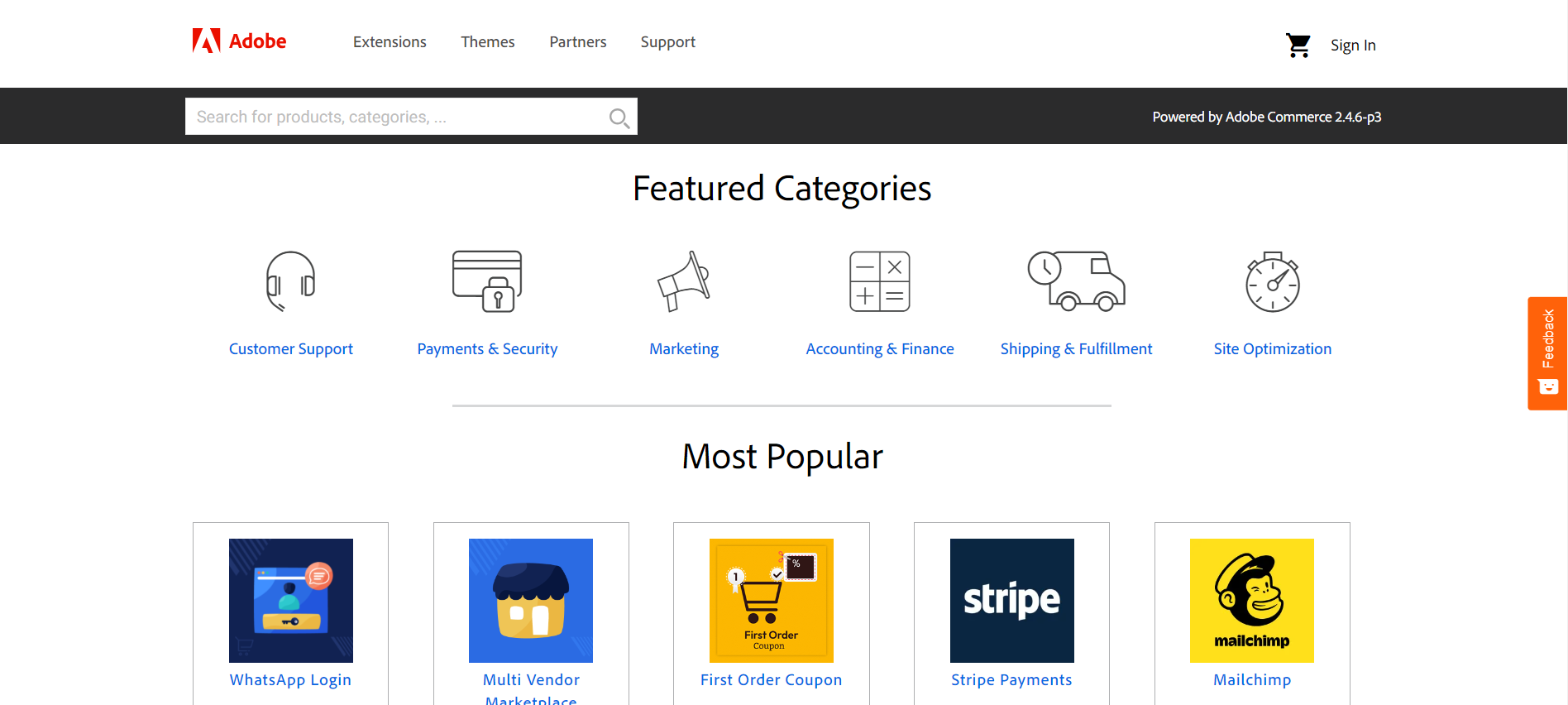
Marketing Features
Design FunctionalitiesRepresents how well each platform allows for creative design and customization of websites.Score Components:
- Template Variety (30%): Range and quality of design templates.
- Customization (30%): Flexibility and options for design alterations.
- User Interface (20%): Ease and intuitiveness of the design process.
- Responsiveness (10%): Adaptability to different devices and screen sizes.
- Innovation (10%): Unique design features and tools.
 6.9
6.9
 8.1
8.1
🏆
Overall Winner: Adobe Commerce(ex Magento)
. Adobe Commerce(ex Magento) stands out for its advanced marketing tools, especially in ads and promotions. Tilda, while offering a range of marketing features, lacks in ads and promotions.

|

|
|
|---|---|---|
|
SEO Tools |
|
|
|
Email Marketing |
|
|
|
Blogging |
|
|
|
Social Media Integration |
|
|
|
Analytics and Reporting |
|
|
|
Ads and Promotions |
|
|
Customer Support
Customer supportEvaluates the quality and availability of support options.Score Components:
- Response time (40%): Speed of support responses.
- Support quality (30%): Effectiveness and helpfulness of the support.
- Availability (20%): Range of support channels (phone, chat, email).
- Resource richness (10%): Quality of self-help and educational materials.
 5.5
5.5
 8.3
8.3
🏆 Winner: Adobe Commerce(ex Magento)
. When comparing Tilda vs Adobe Commerce(ex Magento), Adobe Commerce(ex Magento) stands out with its comprehensive 24/7 customer support through phone, email, and live chat. The platform also offers a robust knowledge base, community forums, and extensive documentation, ensuring users have multiple avenues for assistance. Additionally, Adobe Commerce provides enterprise-level support with dedicated account management and access to a global network of experts, making it a reliable choice for businesses of all sizes.
Tilda, on the other hand, offers customer support primarily via email without specifying the hours of availability. While Tilda’s Help Center provides comprehensive articles and tutorials for self-help, it lacks the extensive support channels and enterprise-level assistance that Adobe Commerce offers. This makes Adobe Commerce the superior option for users seeking robust and readily available customer support.
Security
SecurityLooks at the platforms’ security measures and data protection.Score Components:
- Data protection (40%): Safeguards for user and customer data.
- SSL and encryption (30%): Implementation of secure connections.
- Compliance (20%): Adherence to industry security standards.
- Regular updates (10%): Frequency of security updates and patches.
 7.6
7.6
 8.4
8.4
🏆
Winner: Adobe Commerce(ex Magento)
. Adobe Commerce(ex Magento) takes the lead in security with a score of 8.4, compared to Tilda’s 7.6. Adobe Commerce(ex Magento) provides secure private data storage and protection through advanced encryption and access control measures. It also offers regular security updates and patches to address vulnerabilities, secure payment processing, and tools for monitoring and detecting suspicious activity on the website.
Although it may not offer the same level of specialized ecommerce security features as Adobe Commerce(ex Magento), Tilda is committed to maintaining a secure platform for all types of websites. This includes features for cookie consent, privacy policies, GDPR-friendly forms, and options for managing data retention and deletion. Tilda also provides built-in security features such as DDoS prevention and HTTPS encryption to safeguard user data. However, it falls slightly short compared to Adobe Commerce(ex Magento) in terms of overall security.
AI Capabilities
AI capabilitiesMeasures the effectiveness of AI-driven features and tools.Score Components:
- Automation efficiency (40%): Impact of AI on streamlining processes.
- Personalization (30%): AI-driven customization for users or customers.
- AI-Assisted design (20%): Role of AI in website design and functionality.
- Data analysis (10%): Use of AI in interpreting user data and analytics.
 2.1
2.1
 7.7
7.7

|

|
|
|---|---|---|
|
AI Builder |
|
Adobe Commerce does not have AI website builder |
|
AI Ecommerce features |
|
Adobe Commerce integrates AI to enhance eCommerce |
|
AI content generation |
Tilda has introduced an AI feature for generating website content |
Adobe Commerce leverages AI to streamline content creation and optimization |
|
Additional AI features |
|
Adobe Commerce integrates AI across various aspects of eCommerce |
🏆 Winner: Adobe Commerce(ex Magento)
. Adobe Commerce integrates AI across various aspects of eCommerce, enhancing customer service, security, and marketing. It also uses AI for content creation and optimization, inventory management, and price optimization. On the other hand, Tilda’s AI capabilities are limited to content generation.
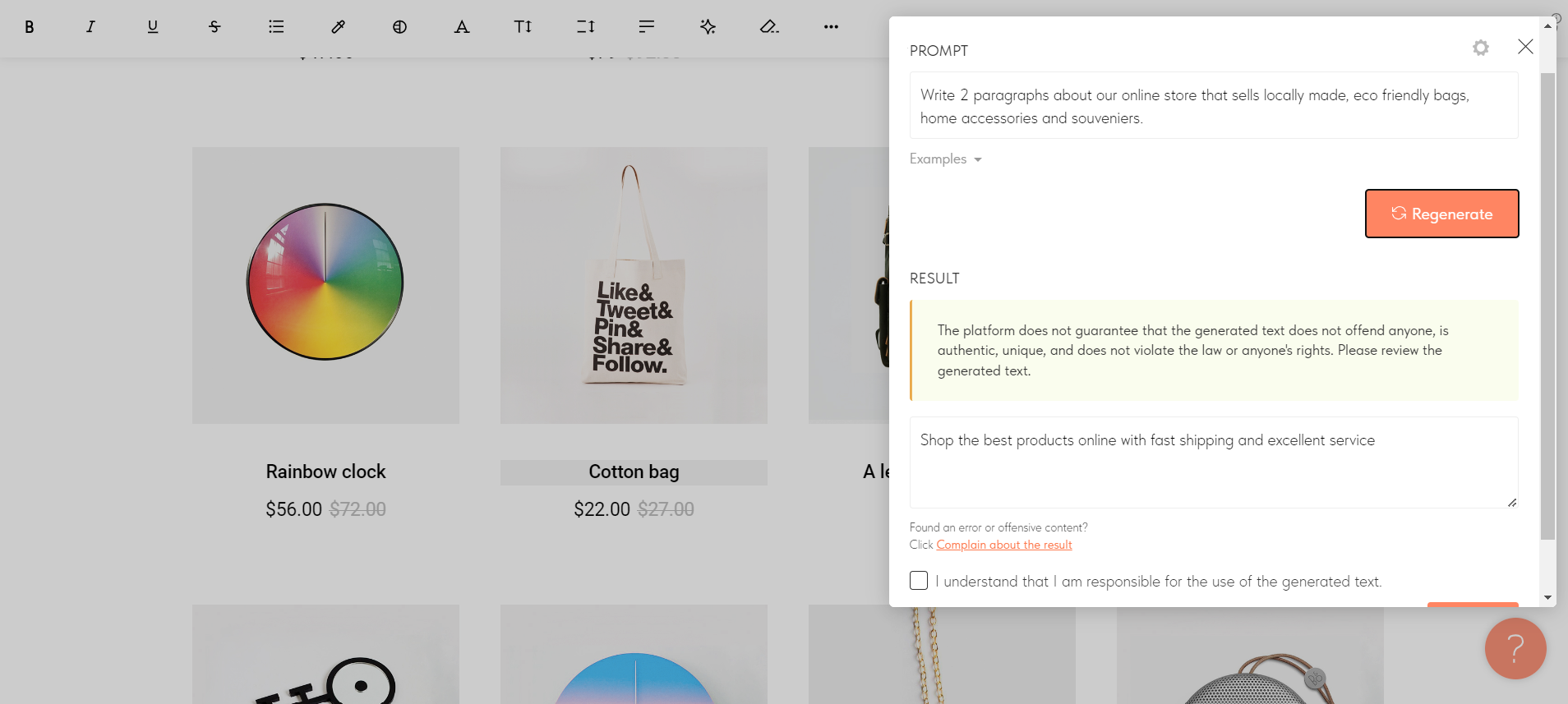
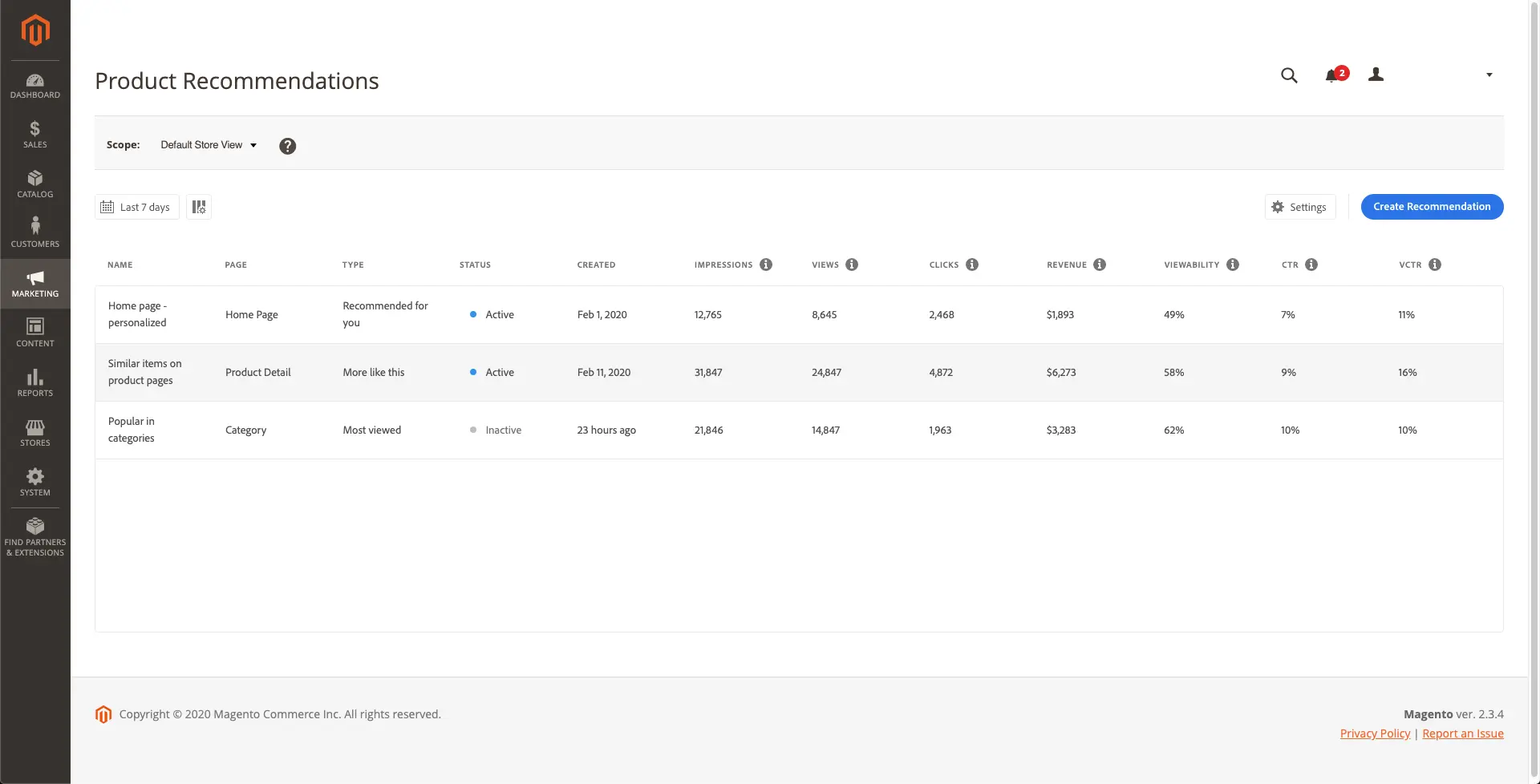
User Management
User ManagementAssesses the platforms’ capabilities in managing user roles, permissions, and accessibility.Score Components:
- Role Customization (40%): Flexibility in creating and defining user roles and
permissions. - Ease of Management (30%): User interface and tools for managing users.
- Access Control (20%): Effectiveness of access control measures for different user
levels. - Scalability (10%): Ability to manage a growing number of users efficiently.
 7.3
7.3
 8.0
8.0
🏆 Winner: Adobe Commerce(ex Magento)
. Both Tilda and Adobe Commerce offer user management features, but Adobe Commerce provides a more detailed and role-specific approach.
- Tilda’s Collaborators feature allows adding teammates with either Full or Limited access. Full access enables collaborators to edit, publish, delete pages, view requests and statistics, and make changes to built-in website services. Limited access allows the project owner to specify what actions the collaborator can perform. This feature is available as a premium offering, and adding more collaborators requires additional payment, with costs adjusted based on previously paid periods. It applies to the entire account, not individual projects, and collaborators can be managed or replaced through the Site Settings.
- The number of users who can edit an Adobe Commerce website depends on user licenses and roles. User licenses, bought separately, determine the total number of users allowed, with additional licenses purchasable as needed. Roles and permissions, managed within the available licenses, control access and modifications, ensuring data security and efficient workflow.
Adobe Commerce(ex Magento) User Roles and Access Levels:
| Role | Description | Access Highlights |
|---|---|---|
| Administrator | Has full permissions to all aspects of Adobe Commerce, including global settings and data. | Full access to all settings, data, and functionalities within Adobe Commerce. Can manage other users’ roles and permissions. |
| Store Administrator | Responsible for the day-to-day management of the store, including products, orders, and customer service. | Access to manage products, process orders, and handle customer inquiries, but may have restricted access to sensitive global settings or data. |
| Design Team Member | Focuses on the aesthetic and user experience aspects of the store, working on content design and layout. | Access to content design tools and functionalities, but restricted from accessing customer, order information, and other sensitive areas. |
| Default User (B2B) | Has view-only access to company profile and credit information, and full access to activities related to sales and quotes. | Full access to sales and quotes activities; view-only for company profile and credit information. |
| Senior Buyer (B2B) | Engaged in purchasing, with access to all Sales and Quotes resources, and view-only permissions to the Company Profile, User and Teams, Payment Information, and Company Credit. | Comprehensive access to Sales and Quotes, with limited viewing rights for company’s financial and profile data. |
| Assistant Buyer (B2B) | Assists in purchasing activities, with permissions to place orders using Checkout with Quote, and to view orders, quotes, and company profile information. | Permission to execute orders and access relevant purchasing data; view-only access to company profile information. |
Additional Features

|

|
|
|---|---|---|
|
SSL Certificate |
|
|
|
Custom Domain |
|
|
|
Free Custom Domain Included |
|
|
|
International Domains |
|
|
|
Mobile Responsive |
|
|
|
Page Speed |
|
|
|
Website Builder Mobile App |
|
|
|
Convert a Website To An App |
|
|
|
Website Analytics |
|
|
|
Multilingual Sites |
|
|
|
Multiple Users |
|
|
User Feedback
Tilda Publishing receives varied feedback from users, highlighting its strengths in offering a no-code, customizable website building experience with features like Zero Block for personalization and easy backend setup. Users appreciate its affordability, user-friendly interface, and responsive customer support. However, criticisms include buggy font customization, limited design elements, and instability in some of its features. Despite these drawbacks, many find Tilda beneficial for creating professional websites quickly and managing multiple sites under one plan, although some users advise caution due to issues with stability and customer support.
Adobe Commerce (formerly Magento Commerce) receives high praise for its comprehensive ecommerce solutions, offering features like customer and order management, scalability, and customization options. Users appreciate its flexibility and ease of use, although some mention a learning curve due to its extensive features. Despite occasional drawbacks like slow speed or complexity, Adobe Commerce proves beneficial for businesses seeking robust ecommerce platforms, aiding in sales growth, customer management, and overall efficiency in managing online stores.
The making of this blog
We followed a clear, step-by-step process to write and research this article.
FAQ
Which platform is better for beginners, Tilda or Adobe Commerce (ex Magento)?
Can I use both Tilda and Adobe Commerce for selling products internationally?
How do Tilda and Adobe Commerce differ in terms of customization and design flexibility?
What are the major differences in pricing and value between Tilda and Adobe Commerce?










